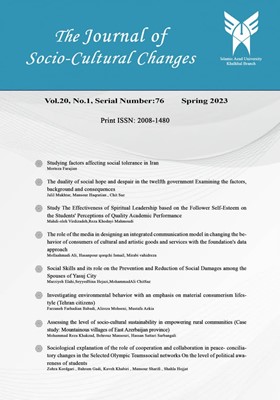Assessing the level of socio-cultural sustainability in empowering rural communities (Case study: Mountainous villages of East Azerbaijan province)
Subject Areas : Social issues of IranMohammad Reza Khakzad 1 , Behrouz Mansouri 2 * , Hassan Sattari Sarbangholi 3
1 - Ph.D student in architecture, Tehran branch, Islamic Azad University, Tehran, Iran
2 - Assistant Professor, Department of Architecture, Central Tehran Branch, Islamic Azad University, Tehran, Iran
3 - Associate Professor, Department of Architecture and Urban Planning, Tabriz Branch, Islamic Azad University, Tabriz, Iran
Keywords: East Azerbaijan province, rural communities, Socio-cultural sustainability, mountainous villages,
Abstract :
rural communities Rural communities play an important role in the balanced development of the country. Rural communities play an important role in the balanced development of the country. Given the issues and problems facing rural communities, the pursuit of sustainable social development in the form of participation, security, customs and public awareness of the villagers seems a necessity. The advent of modern technology, the change in the production structure, the social and economic indicators of rural life have changed and led to the emergence of social anomalies and migration to cities and the reduction of the young generation and consequently the erosion of rural fabric and housing. East Azerbaijan province, as one of the agricultural hubs of Iran, has 2591 villages. Of these, 1067 villages in the province are located in the mountains, so the statistical population of this study is 1067 villages, of which 25 villages have been selected as a sample that had the necessary characteristics for this study. In this study, to measure social and cultural sustainability, effective indicators and criteria have been identified in mountainous villages. By performing various tests using a researcher-made questionnaire in the form of 21 questions, the impact of social sustainability indicators on Empowerment of rural communities confirms the mountainous area of the province. Therefore, the main question of the present study is that according to the heads of rural households in the mountainous area of East Azerbaijan province, what criteria and indicators in terms of socio-cultural sustainability have the greatest impact on improving the quality of life in ?
_||_

